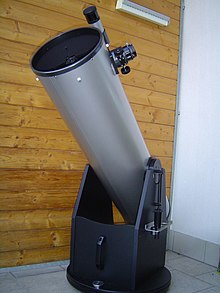Telescope
A telescope (from the Ancient Greek τῆλε, tele "far" and σκοπεῖν, skopein "to look or see"; τηλεσκόπος, teleskopos) makes astronomical objects appear closer to the naked eye. It is an important tool for astronomy that gathers light and directs it to a single point. Some do this with curved mirrors, some with curved lenses, and some with both. Telescopes make distant things look bigger, brighter and closer. Galileo was the first person to use a telescope for astronomy, but he did not invent them. The first telescope was invented in the Netherlands in 1608. Some telescopes, not mainly used for astronomy, are binoculars, camera lenses, or spyglasses.



When telescopes are used with just your eye, an eyepiece has to be used. These use two or more smaller lenses to magnify an image. Without an eyepiece, an eye cannot focus the image. When a telescope is used with a camera or other special scientific tools, eyepiece lenses are not needed. The bigger the aperture (mirror) the more light the telescope collects. It makes faint objects appear clearer.
Most big telescopes for astronomy are made to study very carefully things that are already known. A few are made for searching, such as for unknown asteroids or extrasolar planets. Most big telescopes are made to be used with a CCD (Charge-Coupled Devices) camera instead of just the eye. This is called "Astrophotography". A Go-to telescope is needed to track Deep Sky objects and is placed on an Equatorial Mount for the axis to point towards Polaris, this is called polar alignment.
Telescopes can be used by normal people too, not just scientists. These are amateur telescopes, and they are usually smaller, and they don't cost too much for an amateur to buy. Some of the most popular amateur telescopes are Dobsonians, a type of Newtonian telescope.
The word telescope is usually used for light human eyes can see, but there are telescopes for wavelengths we cannot see. Infrared telescopes look like normal telescopes, but have to be kept cold since all warm things give off infrared light. Radio telescopes are like radio antennas, usually shaped like large dishes.
X-ray and Gamma ray telescopes have a problem because the rays go through most metals and glasses. To solve this problem, the mirrors are shaped as many rings inside each other so the rays strike them at a shallow angle and are reflected. These telescopes are space telescopes because little of this radiation reaches the Earth. Other space telescopes are put in orbit so the Earth's atmosphere does not interfere.
Telescopes are mostly used for looking at celestial objects such as, the stars, planets, moons, exoplanets, etc.
Related pages
changeOther websites
change- European Southern Observatory - OWL
- The Resolution of a Telescope Archived 2004-04-05 at the Wayback Machine
- Image of a Telescope
- Telescope -Citizendium